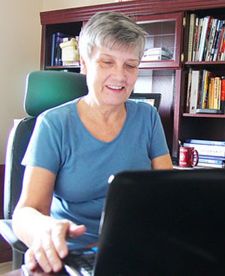Occasionally, we find ourselves right smack in the presence of an unexpected event that influences our lives for a long time. When it happens, it’s hopefully a positive one. One such act, happening three decades ago, was illuminating for me, and I still enjoy sharing what happened.
It was in winter 1980 during the one year in my teaching career I served as a high school teacher at George Rogers Clark High School, in Winchester. During that school year, I also had the added, and mostly gratifying, assignment as the assistant girls’ basketball coach.
The team did well that season because of some talented and experienced players, a good head coach, and lots of booster club and fan support. (My own modesty here is not false, just factual.) And though we lost in the state semi-finals in Richmond, the Lady Cardinals were rated first in the state for most of the season, winning well over thirty games.
Early in the season, we played a game at Louisville’s Seneca High School. I remember the team arriving early with our bus pulling into the lot next to the locked entrance door. Seeing no one around to meet us, someone from our party went to another door or knocked on a window, I’m not sure which, and roused a person to allow our fidgety teenagers and staff to enter the gym.
The obliging person, we learned, was a special education teacher at Seneca who did extra duty as the setup person for games. That included dust mopping the game floor, preparing the sound equipment, and, alas…specifically procuring a record player to play the national anthem. On this occasion, there was indeed a sparse crowd. And, as far as the old-fashioned idea of a record player being used, remember that it was 1980.
The teacher I mentioned, let’s call him Mr. Moonglow, had the looks of a hippie straight out of the Haight-Ashbury District, with hair to his shoulders and form-fitting, worn jeans. He looked about age 30. He talked little and dutifully performed his pre-game tasks.
National anthem time came, and Mr. Moonglow methodically set the needle on the edge of the vinyl record, ready to play the song that has played millions of times before ball games. He picked up a microphone and softly asked the audience (maybe not as many as the total of players on both teams) to stand at the playing of the song. We did, and as the turntable and stylus began moving, the music immediately gave forth the annoying sounds of a broken record, skipping lyrics and leaving the by now silent crowd feeling embarrassingly awkward while standing respectfully at their bleacher seats.
After maybe ten excruciatingly tense seconds, we spectators had our awkward moments turn to moments of genuine awe.
Mr. Moonglow reached down and gently turned off the phonograph. He gingerly picked up the microphone again. No perfunctory apology came, as we might have expected, but in genuine unhippie style, he began mouthing the words of The Star Spangled Banner to the crowd. His singing was poor, but appeared sincere—as sincere as I had ever heard. No doubt, his attempt at carrying a tune was, well, an attempt—not American Idol worthy. But Mr. Moonbow managed to navigate through all the lyrics.
At the end of the spontaneous bit of boldness, there was thunderous applause in appreciation. We were ready for the game to start.
Ironically, Mr. Moonglow didn’t seem to see any need to soak up his two minutes of fame. Appearing almost oblivious to the cheers, he tossed his long hair to the side and went back to his focus on work activities. The message I got from my vantage point was that he was simply a teacher doing extra duties, and he figured that sometimes one must step it up an extra dose of extra.
And yes, I do remember we won the game, but looking back, the game was really only an afterthought. I am blessed then, and today, by the fact that I was there to experience it.
Kentucky boasts an impressive history of noted writers long before such modern writers as Silas House and Barbara Kingsolver, who are two of my favorites and both nationally recognized, came on the scene. Harriette Simpson Arnow certainly is one of the former.
Arnow was born in Wayne County in 1907. She attended Berea College and graduated from the University of Louisville. The future author taught school in Pulaski County and also Louisville. In 1934, she moved to the Covington and Cincinnati area. At the Cincinnati Public Library, she read with glee the classics of literature while doing odd jobs of the non-teaching kind.
Her being around neighbors who had migrated from Appalachia to the area to escape poverty heavily influenced her future writing. The “Appalachian trilogy” of Mountain Path, Hunter’s Horn, and The Dollmaker are the novels she authored that are most notable. In 1949, Hunter’s Horn received strong consideration for the Pulitzer Prize.
Arnow died in 1986 on her Michigan farm, but she made her life’s mark in Kentucky.
Much of the information for the Arnow article came from The Encyclopedia of Northern Kentucky. (UK Press, 2009)
With the just completed Memorial Day weekend, I thought I’d add this uplifting 2014 Facebook post from Beulah Hester, Stanford, Kentucky, whom I profiled in Kentucky’s Everyday Heroes in 2008. Beulah overcame a near tragic childhood accident, then later founded a highly successful on-line company called Ump Attire, which sells embroidered sports clothing all over the world. Here’s what she said:
“Ten years ago yesterday I lost my beautiful daughter Emilie as the result of chronic asthma. Ten years ago today a young girl in Tyler, Texas, with only days to live without a kidney was a perfect match for my daughter’s kidney. So, ten years ago today Shannon received my daughter’s kidney at Baylor University Medical Center in Texas.
“Now Shannon has finished high school, college and her health is good. We visited and met the family and over the last ten years remain in contact with them.”
Oh, the power of ten…and what a living testimony of wise judgment and a caring heart. One can bet that Shannon will always hold Emilie close at hand in her memories.
I’d also like to state my public appreciation for my grandmother, Mabel Flairty, and the six sons she offered in military service. They are my father, Eugene Flairty, along with his five brothers: Ken, Jim, Bob, Donnie, and Alfred. Dad, Donnie, and Alfred are deceased.
Steve Flairty is a teacher, public speaker and an author of five books: a biography of Kentucky Afield host Tim Farmer and four in the Kentucky’s Everyday Heroes series, including a kids’ version. He is currently working on “Kentucky’s Everyday Heroes #4,” due to be released in spring 2015. Steve is a senior correspondent for Kentucky Monthly, a weekly KyForward columnist and a member of the Kentucky Humanities Council Speakers Bureau. Read his KyForward columns for excerpts from all his books. Contact him at sflairty2001@yahoo.com or visit his Facebook page, “Kentucky in Common: Word Sketches in Tribute.” (Steve’s photo by Connie McDonald)



























